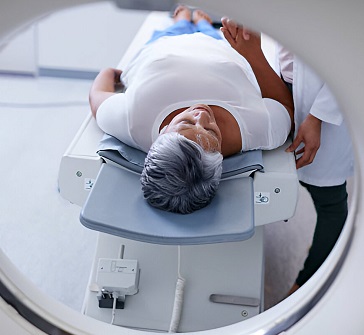 Book Appt.
Book Appt.
 Call Now
Call Now


Ranked as the 6th most common cancer affecting women, Uterine Cancer affects more than 400,000 lives every year. It is usually diagnosed in women who have crossed 50 years of age and the risks are significantly lower in those below 45 years of age. Uterine cancer is very rare in children and occurs mainly in women who have reached Menopause.
What is Uterine Cancer?
Uterine Cancer is the term used for cancer that originates from the cells lining the uterus, a female reproductive organ where the foetus attaches itself and grows post-fertilization. These are broadly classified into two types - Endometrial Cancer and Uterine Sarcoma. The former is so common that the terms Uterine Cancer and Endometrial Cancer are often used interchangeably. It develops from the Endometrial Cells lining the Uterus. Uterine Sarcoma is rare, yet highly aggressive. It develops within the Myometrium.
What are the symptoms of Uterine Cancer?
Common symptoms that may point towards the possibility of one having Uterine Cancer include:
When should you see a Specialist?
It is advisable to see a specialist as soon as you detect any of the above-mentioned symptoms. All these just points towards the possibility of you having uterine cancer but are not definitive. In order to confirm whether a patient has uterine cancer or not, doctors perform some physical examinations and tests. The sooner you consult a specialist, your prognosis would be quicker and you would have a better chance to overcome it.
What causes Uterine Cancer?
Uterine Cancer is caused by abnormal mutations in the DNA of the cells found within the uterus. As the DNA regulates cell reproduction, such mutations can disrupt the same, causing the cells to grow uncontrollably. It is not exactly known why this happens but there are several factors that may be responsible. These include:
Modalities used for the diagnosis of Uterine Cancer
Treatment options available for Uterine Cancer
SHALBY Sanar International Hospitals provides extensive medical procedures backed up with our state-of-the-art technology and a team of highly qualified & experienced clinical experts.

Grade 2 Endometrium Cancer | Ms. Robiyakhon | Uzbekistan | Dr. Archit Pandit | SHALBY Sanar

Male Breast Cancer Recovery Story | Dr. Archit Pandit | Cameroon | SHALBY Sanar

Ms. Nafisa’s Inspiring Breast Cancer Recovery | Dr. Archit Pandit | Uzbekistan | SHALBY Sanar International Hospitals

Stage4 colon cancer is curable - Colon cancer with liver metastasis | Kenya | Dr Archit Pandit

Patient from Kenya Treated by Dr. Archit Pandit | SHALBY Sanar International Hospitals

Double Cancer Victory: Mrs. Salma Kapoor's Inspiring Recovery Story | Dr. Archit Pandit

Patient from Uzbekistan Treated by Dr. Archit Pandit | SHALBY Sanar International Hospitals

Patient from Uzbekistan Treated by Dr. Archit Pandit | SHALBY Sanar International Hospitals

Successful Carcinoma Buccal Mucosa Surgery of a Patient from Nigeria by Dr. Archit Pandit

Successful Colon Cancer Surgery of Mr. Faraidun Kaka Bra Amin Amin's from Iraq | Dr Archit Pandit

Miraculous Recovery of a patient from Uzbekistan battling Ovarian Cancer | Dr. Archit Pandit

Successful Cancer Detection & Surgery by Dr. Archit Pandit | SHALBY SHALBY Sanar International Hospitals

Successful Colon Cancer Treatment of a patient from Iraq by Dr Archit Pandit | Surgical Oncology

Successful Glottis Mass & Carcinoma Vocal Cord Treatment of a patient from Iraq by Dr Archit Pandit

Successful Stage 4 Colon Cancer Treatment of a patient from Kenya by Dr Archit Pandit

Surviving the Odds: 56-Year-Old's Journey with Recurrent Carcinoma Vocal Cord | Dr. Archit Pandit

Surviving Recto-Sigmoid Cancer: Mr. Syamand Ahmed's Inspiring Journey

Success Story: Iraqi Patient's Liver Tumour Treatment at SHALBY Sanar International Hospitals

Cytoreductive Surgery Success: Iraqi Patient's 30cm Ovarian Tumor Removed Safely

Beating Liver Cancer: Mr. Abdirashid's Inspiring Story

Ms. Nejood's Success Over Pancreatic Cancer: A Remarkable Journey

Transforming Smiles: Revolutionary Buccal Commando Procedure

Wide Local Excision Surgery & Microvascular Reconstruction of a Cancer patient

Successful Surgery of Esophgeal Cancer

Successful Lung Cancer Surgery of Ms. Jerioth Wanjiru from Kenya

Para Thyroidectomy on Pt Jawad Kadhim Tweli from Iraq

Dr Archit Pandit discusses the fascinating case of Geeta Rani
Our doctors pen down their research findings and experiences from time to time. Their words provide deep insight into the latest techniques, technologies and other advancements in healthcare. It provides expert answers to all kinds of health questions for real-life issues.
VIEW ALL




Since the day of its foundation, SHALBY Sanar International Hospitals is committed to provide comprehensive healthcare services. It regularly organizes awareness programs in its premises and encourages outdoor healthcare activities and camps with an intent to put focus on preventive healthcare.
VIEW ALL